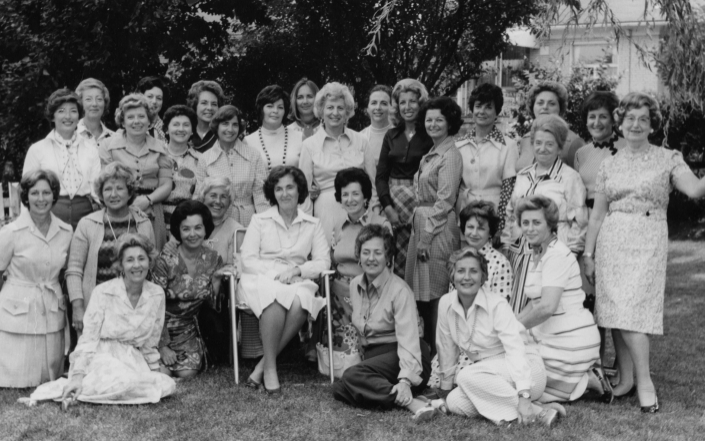Hadassah-WIZO
For nearly a century, Canadian Hadassah-WIZO (CHW) century has been a leading Jewish philanthropic organization dedicated to the causes of health, child welfare, education, and youth aliyah in Israel. Its volunteers have played, and continue to play, a remarkable role in strengthening and enriching communities. CHW works in close cooperation with Young Judaea, providing advisory and financial aid, and with the Zionist Organization of Canada.
CHW traces its beginnings to 1914 when Anna Selick of Toronto attended a Convention of the American Zionist Organization, and heard Henrietta Szold, chairman of the Hadassah Movement of America, report on the organization’s humanitarian activities in Palestine. Selick returned, enthusiastic and determined, and after many futile attempts to get a response, arranged a meeting in October 1916 to which 300 women were invited and 14 responded. The first Canadian chapter of Hadassah was established in Toronto - the Central Chapter of Toronto - with Anna Selick as its president. The first fundraising drive was a house-to-house campaign that netted 500 dollars, followed by the collection and shipment of 112 dozen garments, to assist war refugees from Palestine, encamped in Alexandria, Egypt.
In March 1917, Henrietta Szold was invited to speak to a large gathering of Jewish women convened by Toronto Hadassah. As a result, many women joined and became active in the Hadassah movement. A few months later at the Zionist Convention in Winnipeg, Selick presented a resolution authorizing the formation of Hadassah Chapters throughout Canada. The resolution was adopted, and during this period of enthusiasm created by the Balfour Declaration, chapters were organized in Hamilton, London, Bradford and Windsor.
By 1921, the Hadassah organization came into existence as a national federation, with A.J. Freiman as its chairman. The same year, Hadassah Canada joined the Women’s International Zionist Organization (WIZO), and subsequently changed its name to Hadassah-WIZO. By now, the Toronto Chapter had 300 members with the potential for considerable growth. Rose Dunkelman formed the Rose Chapter and by the fall of 1921, there were soon seven chapters in Toronto carrying on activities: Central Chapter, daughters of Zion Chapter, Kadimah Chapter, Miriam Chapter, Naomi Chapter, Rose Chapter and Western Chapter.
A Hadassah Council of Toronto was formed to stimulate activity within the Toronto chapters, with Anna Selick as chairman and Rose Dunkelman as vice-president. In 1921, Dunkelman, an ardent Zionist, was later elected its president. She was the first president of the Rose chapter of Hadassah, named in her honour, Vice-President of the Hadassah organization of Canada, and a member of the National Executive of the Zionist organization of Canada. A consummate fundraiser, well known for her activism and willingness to strike out on new paths, she originated and edited the Hadassah Cook Book and founded the Toronto Hadassah Bazaar in 1924, and thereafter ran it for many years.
The first official Toronto Hadassah Bazaar was held at the Masonic Temple at Davenport and Yonge. Over the years, venues changed to Varsity Stadium (1945-1948), the Automotive Building at the CNE (1949-1999), CNE’s National Exhibition grounds, then later at the Direct Energy Centre, with increasing demands for space as the popularity of the event grew.
Proceeds from the fairs and bazaars rose exponentially from a thousand or so dollars to hundreds of thousands. They benefitted children, healthcare and women’s organizations in Canada and Israel, through the sale of donated, mostly used, high quality clothing and other merchandise. From modest beginnings, Toronto’s Hadassah Bazaar evolved into what was billed as the “largest one day bazaar in the world”. Bargain hunters lined up as early as 3.00 am, some driving for five hours to attend. The bazaar with grandmothers, mothers, children and grandchildren all working together remained a highly successful annual event for 84 years, ending in October 2008. While Toronto pioneered the mammoth volunteer-run bazaar concept, other cities adopted the idea – Montreal (ca.1932), Vancouver (1951). Ontario Chapters, including Kitchener and London, have also held successful bazaars for over 50 years.
The Junior Hadassah organization in Toronto, as elsewhere, occupied an important position in Jewish life. It afforded young women the opportunity for Jewish identity-building, when they were too old for Young Judaea activity and not yet old enough to assume the responsibilities adopted by the regular Hadassah chapter. Hadassah Rosebuds, an idea that originated in Toronto in 1922 by two ten year old girls who felt they were old enough to take on a small share in the building of Palestine, was adopted and carried out in several centres of Canada and the United States.
Hadassah-WIZO’s original goal, as a non-political and volunteer-driven organization, was to raise funds for refugees in Eastern Europe. Later, their mandate shifted to providing money and support for Jews in Israel, including the Karen Hayesod Fund and the National Fund. They currently fund a multitude of programs and projects for Children, Healthcare and Women in Israel and Canada.
In 1967, at the height of its popularity, CHW had over 16,000 members. Today, it has a dynamic membership of 10,000 country-wide. Ontario has CHW Centres in Ottawa, Toronto and London, and centres without offices in 12 other communities. In addition to being the oldest, the Toronto chapter of Hadassah-WIZO is also one of the largest and most active affiliates of the 304 Hadassah-WIZO chapters in Canada. The chapter, in particular, sponsors youth aliyah, raises funds and honours important volunteers through the organization of tribute dinners, golf tournaments, and other events. The chapter is also responsible for producing the Hadassah Reporter, which is the newsletter that documents the activities of the Toronto chapter.
In addition to providing Jewish women with an opportunity to liaise with other women from the community and volunteer for a worthy cause, Hadassah also promotes important national and international goals. These goals include: encouraging Jewish and Hebrew culture in Canada; extending material and moral support of Jewish women in Canada to the people of Israel who require assistance; and cooperating with other organizations in the promotion of Canadian ideals of democracy.
